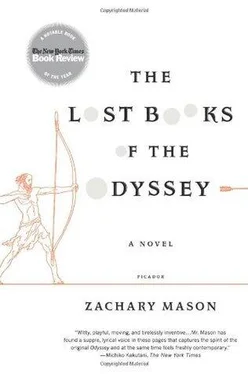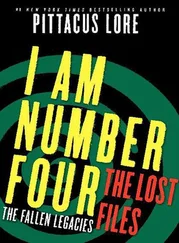When Odysseus and his men washed up on Alcinous’s island he received them graciously, being particularly attentive to Odysseus — he mentioned in passing that he had a daughter but had not yet found the right husband for her. Odysseus weighed the benefits of a new marriage against the open trackless sea and, his spirit much eroded, asked to meet her. A wedding was soon arranged and consummated and not long after the rest of the Greeks followed suit. They had children, bought land, acquired standing and thought less and less and finally never of their wives in Ithaca. They told and retold their travel tales so many times that they became less memories than fables, even to the tellers. The hardness of their youth and of the War left them slowly, but it left them, and eventually there was not a head among the crew that was not white and their swords gathered dust on their mantels.
Like their wandering, this seemed as if it must go on forever but ended abruptly. One night Odysseus had a dream that Athena was standing smiling over him, leaning on her spear, her eyes like white coals. He could feel the chill radiating from her. She had been speaking but he could not remember anything she had said, though his mind was full of a confusion of demons haunting narrow sea-lanes, a witch in silver bowers praying in a wolf’s voice to the moon, and the echoing screams of men packed close in a low-ceilinged room as black arrows sprouted from their throats and hearts. She whispered, “It’s time to go.”
He sat up, wide awake — there was no one but his wife Nausicaa, asleep beside him. The moon shone full through the window and he was as alert as if it had been noon. Odysseus stood straight for the first time in years, throwing off the stoop that he now realized had been a concession to the expectations of age. He took his sword down from the wall, drew it and turned it in the moonlight, the metal flickering like water. He hesitated, enjoying the stillness of the house and regretting the warmth of Nausicaa’s bed. Then he went out, closing the door carefully behind him and, leaning into the strong wind blowing through the empty streets, walked out of the city and along the strand to the spot where the ship had beached. The racing wind that threatened to tear his cloak away had exhumed it and a loose pennant flapped wildly on its mast. His surviving men were there, standing straight as pine trees, and he could not tell if the white in their hair was age or moonlight. Without a word, they set their shoulders to the ship and pushed it toward the sea, wallowing in the sand, redoubling their efforts as her hull touched water. They clambered aboard as the tide took her and pulled her past the breakers and out to sea, bound, they thought, for Ithaca.
A man picks his way along a steel cable strung over a refulgent blue abyss, a ship’s oar over his shoulders for balance. The cable groans and sighs in the infinitesimal breeze. It is so narrow that the man is, when he thinks of it, surprised he is able to keep his footing. Miles in front of him the horizon is shrouded in bright clouds. It may well be the same behind him but he has never looked back. The cable sags, very slightly, just discernibly over the course of what may be hours, or days — he is descending.
Above him (he sees this out of his peripheral vision — to look up would be fatal) is an irregular dark massiveness suggesting mountains. There are iridescent patches that could be lakes or possibly cities. Below is open sky, gradations of deep featureless blue. Now a weariness comes over him and he stops to rest, squatting and balancing the oar across his shoulders, gripping the cable with feet and hands, peering down into the void in which he finds a measure of comfort.
He has been walking and balancing for a long time and his mind wanders. For the most part his reflections are vacant or circular recapitulations of the conditions of his confinement in this limitless open air. When a thought crystallizes it is this: Somewhere a judgment is being made. Even now advocates are striding in flapping robes through bleak arcades toward the ante-rooms where they will make their case before a judge, whose name he almost knows — Minos, or possibly Yama. This stirs something in his arid, empty mind — he wants to argue the case himself.
He knows that if the judgment goes against him a wind will rise in the west, a white rushing mass devouring a hemisphere of sky, racing over him and scouring the cable clean. He considers tactics for such a situation — leaning into the wind and walking on the windward side of the cable, or breaking into a dead run when he sees the storm rising, with every hasty step risking a sudden, final slip, though no end to the cable is in view. He recognizes the futility of these plans but this does not permit him to stop formulating them.
The cable might be getting narrower. His legs might be weakening. He might feel the air stirring. Eyes closed, he hesitates and imagines the languor of falling. He sees himself snatching futilely at the cable, missing, how quickly it would dwindle, and how he would at last have the luxury of looking up at the world he was falling away from, secure in the knowledge that whatever else came the worst had happened. He steadies himself and takes another step.
Once a generation the spring tide reaches the broken walls of Troy and it is granted him to recall that once he was Odysseus.
I am not unhappy, despite the cold and the monotony. There are many things to love about this place — the susurrus of falling snow, the tracks of deer and hare encircling the house, the black rooks landing heavily on laden branches and sending down white showers. And at night the wolves prowl my doorstep, their fur crusted with snow, hungry winter revenants howling their hopeless laments. I dream of cold mists pouring from their open throats and enveloping the valley.
The days are full, and I am never bored. Most of my waking hours are spent in contemplation of my circumstances. My conclusions, so far, are these: someone built this cabin, stocked it with food and fuel, and furnished it, however sparsely. This much is obvious — not even the most active imagination would have it that this house, made of sawn planks, was a natural structure, or that the firewood had split itself, or that the many pounds of biscuit had grown in their sacks like a fungus. What I do not know is the identity of the builder. He has taken no pains to reveal himself, and quite possibly wishes to remain unknown.
He could have been a hunter who needed a forest lodge. He could have been a pioneer trying to cut a farm out of the woods, defeated in the end by the cold and the short days and the snow settling in drifts against the door. There are many possibilities that I have neither proved nor disproved, which stymies me, as the problem of the builder is logically prior to the other mysteries, such as the language of the wolves, what I will do when the biscuit runs out, and my own name.
My ignorance is upsetting but I calm myself by reasserting my faith in logic. There is no action under the sun that does not entail myriad effects, all of which leave signs, and from this chain of signs all previous actions can be inferred. Perhaps at some point one loses the trail of causation because of one’s limited powers of thought or discernment, but building a house is a profoundly disruptive act — as with murder, there are a limited number of probable motivations.
The builder, however mysterious, has at least left a clear sign of his presence. What sign have I left? I have melted snow, eaten biscuits and burned firewood. But what else is there to do? I ask the rooks and they tilt their heads inquisitively, but say nothing.
Читать дальше












